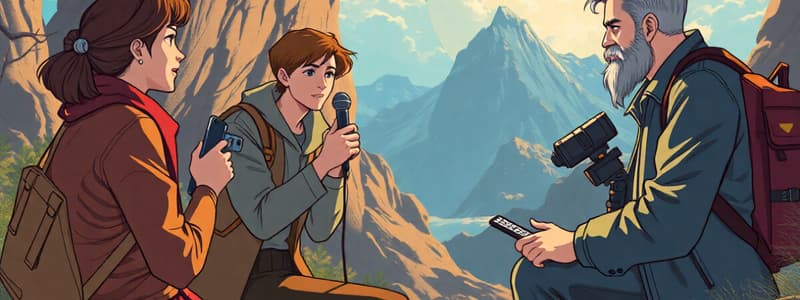Podcast
Questions and Answers
Which interviewer is known for creating a safe space for her interviewees?
Which interviewer is known for creating a safe space for her interviewees?
- Larry King
- Howard Stern
- Oprah Winfrey (correct)
- Anderson Cooper
Great interviewers are always experts on the subjects they interview.
Great interviewers are always experts on the subjects they interview.
False (B)
Name one quality that great interviewers have.
Name one quality that great interviewers have.
The ability to forge connections.
Howard Stern is known for asking questions that a close friend might ask, which helps to reveal ______.
Howard Stern is known for asking questions that a close friend might ask, which helps to reveal ______.
Match the following interviewers with their notable interviewing approach:
Match the following interviewers with their notable interviewing approach:
Flashcards
Effortless Interview
Effortless Interview
A skillful interviewer appears to be effortlessly engaged in a conversation, creating a safe space for the interviewee to open up and express themselves.
Interviewer Preparation
Interviewer Preparation
Great interviewers do their research and are knowledgeable about the topic, the interviewee's background, and potential areas of interest.
Unveiling Deeper Insights
Unveiling Deeper Insights
Asking questions that delve deeper into the interviewee's experiences and perspectives can reveal insights and stories that would otherwise remain hidden.
Masterful Conversation
Masterful Conversation
Signup and view all the flashcards
Present and Engaged
Present and Engaged
Signup and view all the flashcards
Balance in Interviewing
Balance in Interviewing
Signup and view all the flashcards
Thorough Interviewer Preparation
Thorough Interviewer Preparation
Signup and view all the flashcards
Creating a Safe Space
Creating a Safe Space
Signup and view all the flashcards
Newcomer Mindset
Newcomer Mindset
Signup and view all the flashcards
Interviewee Background Research
Interviewee Background Research
Signup and view all the flashcards
Interviewer Focus and Presence
Interviewer Focus and Presence
Signup and view all the flashcards
Unveiling Deeper Meaning
Unveiling Deeper Meaning
Signup and view all the flashcards
Beginner's Mindset Interviewing
Beginner's Mindset Interviewing
Signup and view all the flashcards
Balancing Knowledge with Curiosity
Balancing Knowledge with Curiosity
Signup and view all the flashcards
Study Notes
Interviewing Techniques
- Effective interviewing is effortless, informing, surprising, and evoking emotion. Great interviewers are fully engaged, uncovering hidden thoughts and feelings, clarifying information, and forging connections seamlessly.
- Skilled interviewers navigate conversations, gaining access to hidden thoughts and feelings, clarifying information, and building connections naturally.
- Examples include Oprah, Anderson Cooper, and Howard Stern, offering detailed, contextualized, emotional interviews filled with stories.
- Oprah creates a safe space for interviewees to open up honestly.
- Anderson Cooper researches interviewees thoroughly and guides them through timelines.
- Howard Stern asks insightful, personalized questions, eliciting honest stories, avoiding obvious questions.
- Interviewing proficiency is developed through experience, passion, and practice, not innate talent.
- Interviews done well appear effortless and fluid, informing, surprising, and evoking emotion. The interviewer is fully engaged in the conversation, gaining access to hidden thoughts and feelings, clarifying unclear information, establishing connections effortlessly.
Interviewing Mindset
- A beginner's perspective (uninitiated) can provide deeper insights.
- Extensive preparation is vital. Understand the subject, key players, interviewee's background, and formulate hypotheses beforehand.
- Building rapport and engagement are crucial. Common interests and connections help. Focus on the "why" and "what does it all mean" aspects of situations, not just the "what."
- Be present and avoid distractions. Recognize interviewees' desire for their perspectives to be heard and validated. Every interviewee wants to feel seen and heard.
- Interviewing skills can be developed, even with a lack of subject matter expertise. A subject-matter novice can often gain deeper insights
During the Interview
- Minimize note-taking, relying on audio/video recording. Jot down key words, phrases to prompt follow-up questions.
- Ground yourself physically.
- Avoid focusing solely on major questions. Explore "off-road" topics to reveal unexpected insights.
- Build rapport early with open-ended, welcoming questions; learn about the interviewee.
- Maintain openness and interest by using the interviewee's name, referencing prior statements, and demonstrating active listening.
- Value silence, pauses, and smiles to encourage thoughtful answers and allow for consideration.
- Comfortably clarify or gently challenge perspectives thoughtfully, exploring different viewpoints and avoiding provocation.
- Address interviewees who stray. Gently remind them of the interview goals, offering positive regard and appreciation for what was said. Rephrase the focus if necessary, "Let's table this point and return to it later if time permits." gracefully shift the discussion.
- Practice and review past interviews to improve techniques.
Interviewing Personalization
- Adapt your style to each interview. Build on approaches from others but establish your unique voice and style. Don't imitate others.
- Every interview is unique. Use prior experience but establish a distinct approach.
Interviewing Techniques (Additional Points)
- Be aware of the balance between blissful unawareness and expert knowledge in your interviews.
- Thorough preparation is needed: research the topic, key players, and interviewee's background to formulate hypotheses.
- Building rapport is key. Focus on the "why" and "what it all means" in addition to the "what."
- Be fully present, without distractions, validating interviewees' desires to be heard.
- Use audio/video recording instead of extensive notes. Use brief notes for follow-up questions.
- Embrace "off-road" moments to gain unexpected insight.
- Engage interviewee interest; use their name, reference previous statements, and demonstrate active listening.
- Value silence. Allow for thoughtful pauses and responses, and use smiles and nods.
- Gently challenge perspectives; your goal is thoughtful exploration, not provocation.
- Guide interviewees back on track when necessary (e.g., politely refocus the conversation) by appreciating their contributions, but gently redirecting to the schedule.
- Practice and review past interviews for improvement.
Studying That Suits You
Use AI to generate personalized quizzes and flashcards to suit your learning preferences.




